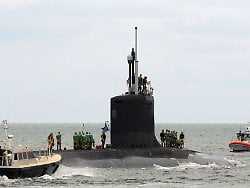Secret service sets trap
US engineer wanted to sell nuclear secrets
2/15/2022 8:34 am
It looks like something out of a spy thriller: a US Navy engineer admits to having passed on secret information about nuclear submarines to a supposed customer country. To do this, he draws on an entire repertoire of agents. But the FBI fooled him.
A US Navy engineer has admitted in court that he tried to sell secrets about nuclear submarines to a foreign power. According to the US Department of Justice, the 43-year-old confessed after he was arrested with his wife four months ago. In exchange for the guilty plea, he is to receive a prison sentence of 12.5 to 17.5 years. The engineer had been tricked by the authorities and the supposed customer country.
The suspect’s wife had previously protested her innocence. The teacher had asked for release from prison so that she could take care of the two young children. But her husband’s deal with the judiciary puts a strain on her too. According to court documents, she “knowingly and voluntarily participated in a conspiracy to divulge classified information to another person with intent to benefit a foreign nation.”
Accordingly, she stood guard while the engineer operated three dead mailboxes, such as those used by secret services for covert communications. Her husband had hidden memory cards containing stolen secrets in a peanut butter sandwich, a packet of gum, and a band-aid wrapper. The court documents did not reveal which country the couple intended to sell information to. However, it was a country allied with the USA whose main language is not English. According to the documents, the country cooperated with the FBI.
work on reactors
According to the US Department of Justice, the engineer had been designing the reactors for the Virginia-class submarines, the US fleet’s latest generation of attack submarines, since 2012. In April 2020, he sent a package abroad from a return address in Pittsburgh, Pennsylvania.
The package contained “a sample of classified data and instructions for establishing a covert relationship to acquire further classified data,” the Justice Department said. The engineer then communicated via encrypted e-mails with a person who he assumed was a representative of the foreign government. “In reality, the person was an undercover FBI agent.”
Over several months, the engineer received tens of thousands of dollars worth of payments in cryptocurrency. In return, he provided documents about the hidden memory cards three times. The FBI worked closely with the alleged buyer country on the investigation. According to an agreement, the country once even hoisted a flag at its embassy in Washington to gain the engineer’s trust.
Nuclear submarines were last at the center of a conflict with France last September. At the time, Australia had canceled a multi-billion dollar deal with France to procure US submarines instead.
